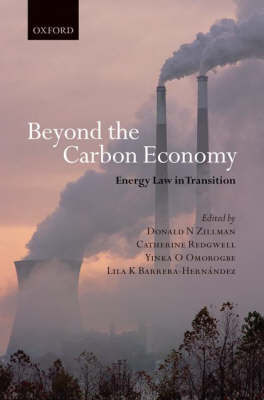By Kirsty McHugh, OUP UK
In today’s Countdown to Copenhagen post, Donald N. Zillman looks back at predictions he and his fellow authors of Beyond the Carbon Economy: Energy Law in Transition made two years ago, and discusses what today’s position is in light of next week’s COP15 conference. Professor Zillman is President of the University of Maine at Presque Isle and Edward Godfrey Professor of Law, University of Maine at Fort Kent.
Click here for the other Countdown to Copenhagen posts.
Slightly more than two years ago, a consortium of 33 authors from 20 nations put the finishing touches on a book called Beyond the Carbon Economy. The authors were law professors, practicing lawyers, and participants in public policy in the fields of energy, natural resources, and sustainability. We noted that 80 percent of the world’s energy for all purposes came from the three familiar hydrocarbon fuels—coal, petroleum, and natural gas. Even the most radical alternative scenarios indicated that the three hydrocarbon fuels would still be major sources of world energy two decades from today. But, compelling reasons demanded that businesses, government leaders, and citizens around the world look beyond carbon, and begin NOW.
 We identified five factors compelling that redirection. The first was climate change and other environmental harms from the use of the fossil fuels. When we wrote, the April 2007 Report of the Intergovernmental Panel on Climate Change had just been released. It made the clearest case yet that climate change was real, was happening now, and that it clearly implicated the fossil fuels.
We identified five factors compelling that redirection. The first was climate change and other environmental harms from the use of the fossil fuels. When we wrote, the April 2007 Report of the Intergovernmental Panel on Climate Change had just been released. It made the clearest case yet that climate change was real, was happening now, and that it clearly implicated the fossil fuels.
The second factor was the myriad of concerns over energy security. We noted: “Were the carbon fuels equally distributed around the world, and were rules of the market economy fully accepted by both producer and consumer nations, the problem would be largely one for economics to solve.” They aren’t and wars, civil unrest, political boycotts, and the like have kept much of the world uneasy since the early 1970s.
The third factor encouraging the move beyond carbon is the enormous increase in demand for energy. China and India are just the most visible examples of nations moving rapidly to a time when a substantial proportion of their population expect personal motorized transport, fossil fuel heated residences and workplaces, and steady access to electricity.
The fourth, and most controversial of the factors, is the potential decline in supply of the fossil fuels, primarily petroleum. The authors recognized the range in views from a strong belief in “peak oil” theories to a confidence in market economics that supports the view that “nothing would increase supplies like $200 per barrel oil.” Even advocates of the latter view, however, have to deal with the heavy investment costs of bringing more fossil fuels to the market.
The fifth factor–“the most sobering of them all”– is the energy needs of the one third of the world’s population who live today without modern energy services. The carbon economy has done them few favors and the future looks even more bleak for them than the present. Even if compassion or a rough sense of equity don’t prompt action, the prospect of dozens of failed states turned to terrorist havens should.<


